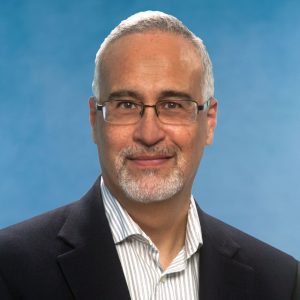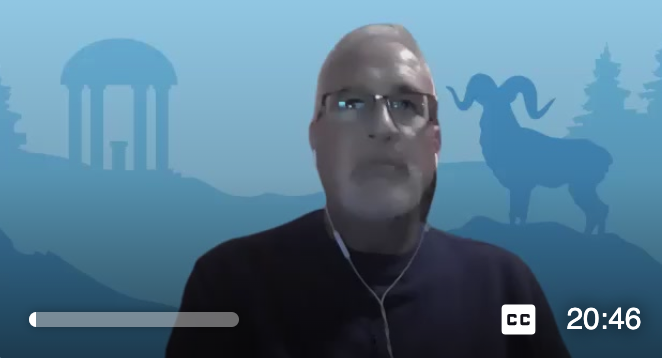‘We’re all Prompters Now!’ An Interview with Mark McNeilly

How will AI reshape university campuses? Visual created with Bing Image Creator
Mark McNeilly is a Professor of Marketing and Organizational Behavior at UNC Kenan-Flagler Business School, and co-chair of the Generative AI Committee at UNC Chapel Hill. In the interview Mark McNeilly and Stefanie Panke discuss the implications, advantages, and challenges of generative AI in both higher education and the workplace. Mark McNeilly’s advice for faculty is clear: Start using AI tools! Faculty should embrace AI tools like ChatGPT to help with tasks such as writing emails, creating meeting agendas, and formulating lesson objectives. Instructors should test AI on their assignments and exams to anticipate how students might use it. AI can be integrated into course delivery and can assist in content creation, brainstorming, summarizing, and more. Investing time to experiment will allow faculty to understand both strengths and limitations. Despite the hype around AI, McNeilly believes that it’s not going to replace universities or professors anytime soon.
Interview (Edited Text Version)
Stefanie Panke: Thank you so much for agreeing to this interview. To get us started, I would love to know what first brought you to the topic of AI and education. What sparked your interest?
Mark McNeilly: Sure. I come from a technology background. Before transitioning to academia, I worked at IBM for many years and later served as a marketing executive. Having an interest in technology and, as a marketing person, being used to explaining technology in ways that people can understand, I was naturally drawn to AI. When I first came across ChatGPT in November, I was amazed by its capabilities and saw immense possibilities. In January, I began contacting colleagues within UNC to discuss the potential applications and implications of AI.
Stefanie Panke: Can you talk about the role of the Generative AI Committee at UNC Chapel Hill and the steps the committee is taking to prepare students and faculty for an AI-infused world?
Mark McNeilly: I serve as a co-chair of the UNC Generative AI Committee alongside Dean Stan Ahalt, the Dean of the School of Data Science and Society at UNC. Our primary focus is on providing resources and guidance for students and faculty. We’re creating training programs and consolidating all our resources on a website available to the UNC community and the public (https://provost.unc.edu/generative-ai-employee-resources/). Our goal is to offer guidance on how to use AI ethically and appropriately, while also considering the strategic leverage of AI in teaching and research.
Stefanie Panke: Which AI tools do you frequently use?
Mark McNeilly: I often use ChatGPT, especially the GPT-4 version because of its improved performance and features. I also use Bing’s tools, which offers Internet connectivity and image creation capabilities. I also use Midjourney to create images for presentations and for my Substack newsletter, Mimir’s Well, where I write about AI and other topics.
Stefanie Panke: That brings me to my next question. I wanted to get your opinion on transformations in the job market. Which sectors do you believe will be most impacted? Are we doing enough, and what should we be doing to prepare our students for these changes?
Mark McNeilly: There will indeed be many sectors affected. Take the legal profession, for instance. It’s set to experience significant disruptions due to AI automation. This has both pros and cons. On one hand, automation can eliminate tedious tasks and enhance productivity and creativity. On the other hand, it might disrupt many jobs, even eliminating some while creating new ones. Legal is just one of the industries that’s poised for major changes. Generative AI might eliminate some lower level jobs there. However, it will also introduce new legal challenges, leading to potential job creation. For instance, companies specializing in generative AI may end up hiring more lawyers than programmers due to legal challenges arising from content use and data scraping. Beyond legal, sectors like healthcare, sales, marketing, and most office jobs are also likely to be impacted. According to a Goldman Sachs study, between 25 to 50% of tasks in cognitive jobs might be affected by these changes.
Stefanie Panke: I have talked to students who expressed concerns that generative AI will undermine the value of their academic achievements. Since a machine can theoretically pass exams and submit a thesis, they’re worried their degrees might become meaningless. How would you address these concerns?
Mark McNeilly: It’s essential to recognize that the rise of AI will alter what we value in the workforce. David Brooks from the New York Times remarked that in the age of AI, we should major in being human. While AI might take over certain tasks, it will amplify human attributes. We’ll always need domain-specific knowledge, imagination, and the drive to ask the right questions. Furthermore, traits like extroversion, charisma, and the ability to build networks will become even more critical.
One area where we’re probably failing in higher education is ensuring students are adaptable and resilient and able to cope with uncertainty because the future is going to be even more dynamic.
In the end, yes, generative AI skills are essential, but it will take years for this new technology landscape to fully evolve. 80% of the people I talk to have either never tried it or tried it once or twice and quit. So there’s a very small group of people who are actually using AI. The majority are still unfamiliar with it, and there’s significant inertia within organizations. There’s a huge amount of bottlenecks and challenges in organizations to get people to adopt AI. I expect it’s several years probably for this whole thing to play out.
Stefanie Panke: In a recent article you posted on Substack, you discussed three paradoxes of AI: It acts as both a great equalizer and a significant divider. It has inhuman capabilities, yet sometimes it’s better at emulating human behavior. It’s a force of both creation and destruction. Could you elaborate on how you formulated these three lenses for looking at AI?
Mark McNeilly: The impact of AI really varies depending on the type of job. For instance, there was a study concerning customer service roles. When AI tools were introduced, the performance of novices improved significantly, nearly reaching the level of the experts. The experts showed little to no improvement. In this context, AI served as a great equalizer, bridging the gap between newcomers and seasoned professionals.
In some domains, like coding, novices found it took them longer to complete tasks using AI compared to veterans in the field. The seasoned coders leveraged AI to further enhance their efficiency. In this way, AI can serve as an inequalizer. The outcome largely depends on the nuances of the job and the specific skills that are required. This raises questions about how employers will adapt to these shifts, influencing their hiring and potentially letting employees go.
When considering the “better human than humans” paradox, AI often outperforms us in accuracy, speed, and breadth of domain knowledge. For instance, an AI can exhibit more “human-like” traits than some professionals, displaying better bedside manners than certain doctors due to its infinite patience and 24/7 availability. It can assist in creative tasks, such as generating analogies or brainstorming. However, for highly specialized tasks, AI currently cannot match human expertise. Though it has vast memory and can be cost-effective, AI remains a significant investment.
Lastly, the creator and destroyer dichotomy is analogous to the Hindu deity, Shiva, representing creation, destruction, and transformation. Generative AI, as implied by its name, has the capacity to innovate – it can produce new content, tools, use cases, and even new jobs like AI engineers. Conversely, it will also lead to obsolescence in certain jobs and tools, reshaping entire industries.
It’s going to transform our world. We’re still starting out, it’s going to take a lot of time, but it’s pretty clear that these transformations are going to occur and that they’re going to be massive in their impact.
Stefanie Panke: What advice would you give other faculty, especially those who have not touched any AI tools yet or belong to that large group of people who have used it once or twice and then thought, “Oh, that’s not for me.”
Mark McNeilly: You have to realize that we are all prompters now. Start using tools like ChatGPT, at least version 3.5. Begin by using it as a search alternative for some things. Test it against traditional search. Consider using it to help draft emails or meeting agendas. Also, set aside specific times to start using it. Begin testing your assignments and exams with it to gauge its performance, then adjust as needed. Incorporate guidelines in your syllabus regarding AI use, and hopefully, your university provides guidance on that, too. The AI committee at UNC has been working on this (https://provost.unc.edu/student-generative-ai-usage-guidance/). Think about how you can use it to improve your teaching and how your students can benefit from it in their assignments. For example, ask it for lesson objectives or a 10-question quiz on a subject you’re teaching. You can also use it to summarize articles, request analogies on a topic, or even seek out examples relevant to what you are teaching. Experiment with it. See how it can assist you, and integrate it into your courses.
Stefanie Panke: Thank you so much for your insightful answers. If people want to follow your work or learn more, where can they find you?
Mark McNeilly: My Substack is primarily focused on AI. My latest piece is on how AI will impact universities and professors. And despite the hype, I don’t believe AI will replace us anytime soon. If people want some reassurance, they can read my article titled, “Why Universities and Professors Aren’t Going Away Anytime Soon.”
Video Interview
Watch the full-length video interview:
About
 Mark McNeilly teaches in the areas of marketing and organizational behavior in the full-time MBA and online MBA@UNC programs. He serves as a faculty advisor for the STAR program and executive coach in the Leadership program. Professor McNeilly served as a global marketing executive and has several years of experience with both IBM and Lenovo in the IT industry. His business background includes branding, strategy, marketing, market intelligence, management, manufacturing and personnel. He is the author of a popular strategy book based on Sun Tzu’s “Art of War” titled “Sun Tzu and the Art of Business: Six Strategic Principles for Managers” as well as “George Washington and the Art of Business: Leadership Principles of America’s First Commander-in-Chief,” both from Oxford University Press. Professor McNeilly received his MBA with honors from the University of Minnesota and his BS in finance from the University of Wisconsin-LaCrosse.
Mark McNeilly teaches in the areas of marketing and organizational behavior in the full-time MBA and online MBA@UNC programs. He serves as a faculty advisor for the STAR program and executive coach in the Leadership program. Professor McNeilly served as a global marketing executive and has several years of experience with both IBM and Lenovo in the IT industry. His business background includes branding, strategy, marketing, market intelligence, management, manufacturing and personnel. He is the author of a popular strategy book based on Sun Tzu’s “Art of War” titled “Sun Tzu and the Art of Business: Six Strategic Principles for Managers” as well as “George Washington and the Art of Business: Leadership Principles of America’s First Commander-in-Chief,” both from Oxford University Press. Professor McNeilly received his MBA with honors from the University of Minnesota and his BS in finance from the University of Wisconsin-LaCrosse.

